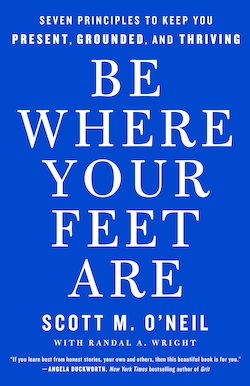When I first met Scot O’Neil, he was a larger than life warrior. It was probably a little more than two decades ago. Bill Clinton was president, Allen Iverson and Pat Croce were leading the Sixers, ultimately, to the NBA Finals, and O’Neil was the CEO of something called HoopsTV.com, a media startup that was right at the burgeoning nexus of basketball and hip-hop. It was the brainchild of the brilliant Seth Berger, who had co-founded the iconic basketball apparel company And1.
O’Neil’s presence filled a room. He hugged, he high-fived, he back-slapped. He had the swagger of an athlete and the self-assuredness of a consummate salesman. HoopsTV.com was ahead of its time, and it didn’t make it. But O’Neil did, going on to land his dream job, as president of Madison Square Garden Sports.
When he became CEO of the Sixers in 2013, I visited him to share my vision of what would eventually become The Citizen. Quite by happenstance, I walked into a type of office pep rally, wherein the peripatetic O’Neil addressed his rabid sales force—there was a lot of shouting and high-fiving and a palpable sense of mission. Mind you, the Sixers absolutely sucked at the time. They’re a great team now, but even then—with a (purposefully?) crap product—O’Neil and his charges somehow sold the hell out of that team, both in terms of advertising and tickets.
“I don’t believe the good life is about finding balance between work and home,” O’Neil writes. “It’s about living the moments we have where and when we have them.”
Now 51, O’Neil has published a book that charts the road a particularly astute executive coach once laid out for him. “In a breakthrough meeting, she told me that, to find my inner peace, it was time to move from the warrior phase to the sage phase, another way of saying that it was time for me to become a leader whose victories are about helping others achieve their dreams and do great things,” he writes. “‘But I love the warrior phase,’ I would repeatedly say back to her. She wanted me to ‘fight, kill, win’ less and ‘embrace, love, teach’ more.”
Be Where Your Feet Are is a collection of lessons learned, courtesy of the gift of hardship. O’Neil started writing the book after the death of his father and the suicide of his best friend from his Harvard Business School days. It is a story of loss and grief and growth; a window into how setback and failure can make you the leader and man you always wanted to become.
O’Neil writes:
I don’t believe the good life is about finding balance between work and home. It’s about living the moments we have where and when we have them. Balance does not breed greatness, and as my good friend Lara O’Connor Hodgson is fond of saying, it is not much fun to play on a see-saw that is perfectly balanced.
The question we need to be asking and answering is: How do you maintain the discipline to be where your feet are? When I’m at my best, I am wholly present. When I’m at work, I’m at work. When I’m with my kids, I’m with my kids. When I’m coaching the seventh-grade girls’ basketball team, I’m totally there, in the gym. On a date night with my wife, Lisa, I am 100 percent present.
Of course, no matter how much I want it to be true, I’m not always at my best. On occasion, Lisa has told me, in her own way, to put my phone down. “I’ll wait,” she’ll say, and then stare me down. Translation: “If you think that text you are reading is more important than our time together, please let me know, and when you are ready to have a meaningful conversation, I am ready.” Hearing her say that never feels great, but it is better than the message I am sending her with my phone in hand, eyes down, and furiously typing.
So, no, I am not perfect, but I aspire to continue to improve and work toward a more present me, because I am better at all aspects of life that matter when I am in that space. And so are you.
Whether you’re an overwhelmed parent or a stressed-out CEO, be prepared to look inward when you join us next Tuesday night at Fitler Club—our first in-person event in over a year!— to hear O’Neil’s heartfelt and holistic definition of what success is and ought to be.






